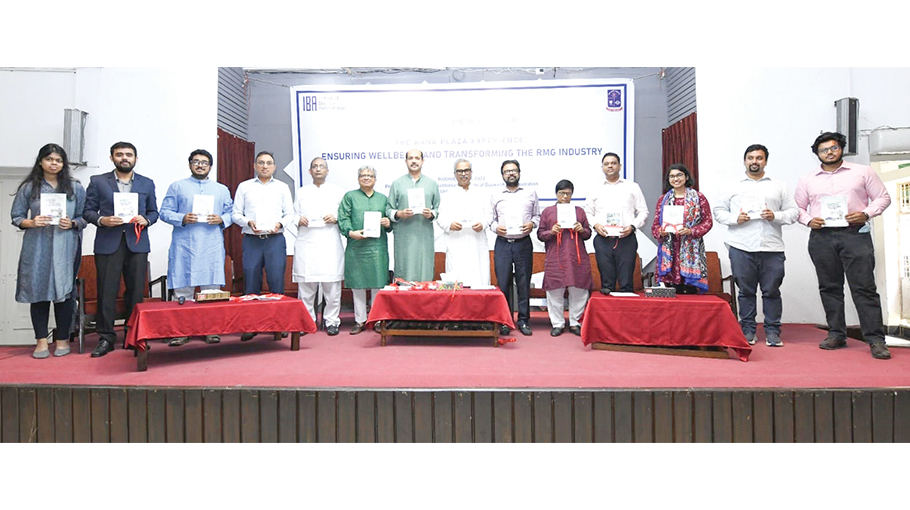IBA teachers delve into the post-Rana Plaza RMG industry

The unveiling ceremony of an upcoming book "The Rana Plaza Experience: Ensuring Wellbeing and Transforming the RMG Industry" was held at Professor M Shafiullah Auditorium at IBA, on the Dhaka University campus on Tuesday.
The book was edited by Professor Mohammad A Momen, director of the IBA faculty and Dr Syed Ferhat Anwar, professor of marketing. The research was coordinated by Khaled Mahmud, an associate professor of the faculty and Fatematuz Zahra Saqui, lecturer of the same faculty.
The book was dedicated to all lives lost and injured during the Rana Plaza accident.
Prof Momen discussed the book and presented the summary in brief. The book contains the history of the RMG industry, turmoil during the Rana plaza accident, recovery and the transformation of the RMG industry afterward.
Total 27 in-depth interviews were conducted for this research. The book analyzed the responses of various stakeholders including buyers, foreign brands, journalists, labor unions, RMG workers, government agencies, press media, witnesses, photojournalists and victims.
The IBA has interviewed 36 injured ranging upto 70% of injury and families of two deceased. There were 26 females and 12 males. Among them 4 didn't share the amount of compensation they received. Other than that all of them received an average compensation of Tk 2,64,000.
Government, NGOs, factory owners and other associations helped them with compensation and get back to normal life as much as possible. They shared their grief and also mentioned that there was more that could have been done for them. It was an expensive learning for the RMG industry.
IBA also surveyed 500 industry workers at different levels by using stratified sampling techniques from 100 factories. The garment factories were selected from the MiB (Mapped in Bangladesh) database, spread over five major industrial zones around the country: Dhaka, Mymensingh, Narayanganj, Gazipur and Chittagong from where 180, 13, 108, 159 and 40 workers were interviewed respectively.
Candidates having at least an experience of over 6 months in the RMG industry were selected for the survey.
Among these 500 workers, 335 were chosen from BGMEA member factories and others were from non BGMEA membership factories.
Among them 93% of the workers intend on working in the industry for at least a minimum of 5 years. 91.2% of workers mentioned that they receive bonus timely. A pleasing 94.4% workers are satisfied with their job. 80% of workers are satisfied with their salary. Around 95% workers have a neutral to high satisfaction level regarding workplace facilities like toilet sanitation, lunch hour and canteen, pure drinking water, transportation facilities.
Some 94% of workers have not faced any workplace injury. 84.2% of workers feel safe at their workplaces. On an average, 75% workers receive paid maternity and sick leaves. 69.4% receive fire drill training from their workplaces. The researcher found that Labor Law was amended in 2013 and 2018 and Labor Rules promulgated in 2015 made these more favorable for workers. From 2013 to December 2021, a total of 49 complaints on unfair labor practices were submitted to the Department of Labor.
Of all the complaints, 10 have been settled and the hearing is under process for the remaining 39. There is an interesting finding that 90 women RMG workers are pursuing higher studies in a multicultural global environment at the Asian University for Women. Their salaries are being paid by their respective entrepreneurs.
The researchers also found that Bangladesh is the home of the highest number of green factories. Currently, the country has 193 LEED Green garments factories certified by the U.S. Green Building Council (USGBC) of which 69 are platinum. 550 more factories are in the process of getting LEED certification.
None of the entrepreneurs said that buyers pushed them to establish green factories. They themselves have taken initiative to establish green factories. The researchers also reported that DANIDA supported a 5 years long research project, CREATE, to investigate the Circular Economy transition in global garment value chains related to Bangladesh's apparel industry. The researchers also found that BGMEA joined the Fashion Industry Charter with an ambition to reduce GHG emissions by 30%, reduce blue water footprint by 50%, ensure gender equity by 100%, and many more.
They want to achieve all of these by 2030 under the umbrella of the Sustainable Strategic Vision 2030 for the RMG industry. The researcher suggested that 10 years after Rana plaza, the RMG industry has made commendable accomplishments, yet more needs to be done to ensure a sustainable ecosystem in the industry. As far as compensation to workplace injuries is concerned, a legal framework to compensate workers is required.




